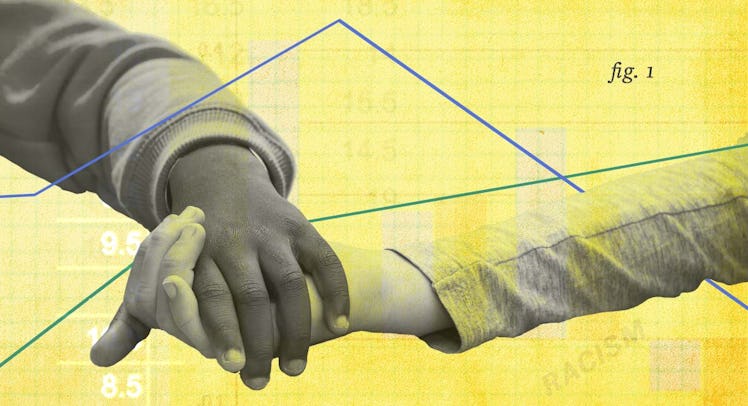Science Proves Little Kids Are A Little Bit Racist Even When Their Parents Are Not
Infants aren't real big on multiculturalism. They prefer same-race faces and shun adults with heavy accents.

Open-minded as they may be, infants aren’t real big on multiculturalism. They prefer faces that look most like their mother’s and father’s, which means they, inevitably, shun other-race faces. And their ears, attuned to the cadences of their parents, seldom appreciate exotic accents. But, as they grow older, children’s biases are less tied to familiar sights and sounds and largely determined by the subtle cues they take from their parents. Even if you’re not bigoted, studies suggest, kids catch on to your subconscious prejudices—and may even mimic them.
This is all to say that kids are a little bit racist. This is not their fault and their prejudice is, unlike the prejudice of adults, easily overcome. But it remains worrisome to parents who see behavior indicating certain racial and cultural proclivities. In the interest of putting some of those concerns to rest and helping parents identify problematic outliers, here’s a look at the data on kid racism.
Infants Prefer Same-Race Faces
Although babies don’t seem to care what they’re looking at for the first few weeks of life, studies suggest that children develop preferences for certain faces once they reach three months of age. The data below comes from a 2008 study of this phenomenon, which involved a small sample of 64 Caucasian 3-month-olds. Researchers showed each child a Caucasian face, alongside either Middle Eastern, Asian, or African face. The children spent about 60 percent of their time, on average, staring at the Caucasian faces. They seldom glance at other races.
“The results indicate that the facial input received by infants during the first 3 months of postnatal life is sufficient to induce a visual preference for own-race faces,” the authors write.
Toddlers Are Afraid Of Foreign Languages
A similar study presented 24 English-speaking 6-month-olds films of two women speaking either English or Spanish. Although infants looked at each woman while they were speaking, once the speaking stopped and the women remained frozen on the screen, they focused their attention predominantly on the woman who had spoken English. When they repeated the trial with two English-speakers, one with a Spanish accent, they found similar results.
One disappointing nugget: researchers repeated the experiment with English-speaking 5-year-olds, and found similar biases. The kids were shown photographs of two children, and listened to audio of one speaking in French and the other speaking English. When asked whom they would rather have as a friend, most of the children chose kids who spoke their language.
Your Subtle Racism Makes It Worse
This final data set comes from a new study, in which parents responded to statements about prejudice (“immigrants take our jobs”) and a series of questions that revealed their parenting styles. They found that parents whose responses indicated subtle prejudice were more likely to have kids who only wanted to be friends with members of their own race. And parents who displayed the authoritarian (my house, my rules!) and permissive (my house, no rules!) parenting styles also raised subtly biased children. The only parenting technique that seemed to protect against raising prejudiced kids was the authoritative style — a moderate approach that involves treating children like adults, while also enforcing rules and providing emotional support.
“Our research revealed that parents are powerful vehicles of ethnic prejudice transmission towards their children,” co-author on the study Giuseppe Carrus of Roma Tre University in Italy told Fatherly. “Not only through their explicit communications and actions, but also through their unaware and unconscious beliefs, stereotypes and automatic behaviors.”
This article was originally published on